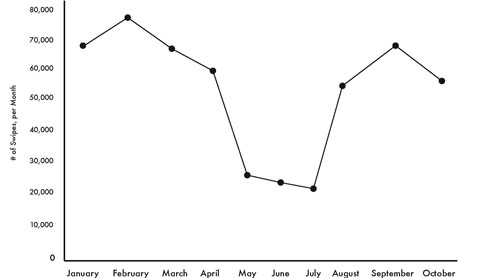 Students may be waiting to get one more shot at the pecan pie before starting on the spring break beach-bod chiseling, but the Student Recreation Center is already getting in shape to handle the increased traffic that accompanies the return to campus in January.
Students may be waiting to get one more shot at the pecan pie before starting on the spring break beach-bod chiseling, but the Student Recreation Center is already getting in shape to handle the increased traffic that accompanies the return to campus in January.
According to data compiled by the Rec Center for 2011, the first two months back from winter break are its busiest. Computers logged 68,722 and 79,441 visits, measured by Action Card swipes, during January and February of 2011, respectively. These tallies substantially outpace 2011’s monthly average of 52,574.
Rec Center Executive Director George Brown said the staff is currently taking several steps to prepare for the post-break influx.
“What people most get frustrated about is not being able to use equipment,” he said. “We always stock up on more replacement parts for equipment in December. Also, we make sure all of our maintenance people are trained and ready to fix something when needed.”
The logistics extend beyond simply ordering new parts and knowing how to use them, however. Employee schedules and duties are being worked out for the next semester, and come January the Rec Center will be operating at maximum staffing.
“We want all of our staff ready,” Brown said. “We have employees in the weight room, on the basketball courts and throughout the rest of the building. Our goal is to have mobile supervision everywhere to help deal with any issues that may arise.”
Brown also said the group exercise department is formatting a new schedule for the spring semester featuring additional class times and quicker turnaround between sessions.
For students looking to avoid a packed post-holiday gym, Brown suggested coming outside of the Rec Center’s peak traffic hours between 4 and 9 p.m. on Mondays, Tuesdays and Thursdays.
The discrepancy between January and February totals and the rest of the year’s averages suggests the increase in usage is rooted in customers’ New Year resolutions to quickly lose weight in preparation for beach season.
Psychology professor William Hart cautioned against setting unrealistic goals and expecting instant results, citing the results of a paper showing 60 to 70 percent of people give up on their quick fix plans early on.
“Data suggests most people fail to maintain their resolutions over the year,” he said in an emailed statement. “Most people abandon their resolutions by three months.”
Hart emphasized the importance of long-term, conscientious self-regulation in achieving goals like New Year weight loss. He outlined the following three “tricks” to a successful resolution.
Make “implementation intentions” by writing down concrete goals for improvement, “think big picture” to stay on track in the long run and remember, “practice makes perfect.”
“Sometimes people forget the reason why they made the resolution,” he said. “When you are struggling to go to the gym, don’t focus on how hard or annoying it feels to work out. Think about why you need to go to the gym: I want to be happy, healthy and attractive.”
Brown also stressed the significance of the big picture and recommended fun, varied workouts to maintain long-term interest in an exercise regimen.
While he acknowledged the significant role New Year resolutions play in his facility’s spike in attendance, Brown felt the steady pattern of increased Rec Center usage represents more a sustained emphasis on health and fitness than a fleeting seasonal inspiration.
“Exercise and positive nutrition are a lot more mainstream,” he said. “Students are sticking with their fitness programs longer. Five years ago we would have seen a much more substantial drop-off in people coming in March and April. Our numbers show that more students are using [the Rec Center] more often.”
He referenced Rec Center figures showing 82.7 percent of the student population had used the facility at least once in 2010, the culmination of a multi-year upward trend.
Brown encouraged students to make fitness and health a lifestyle facet rather than a holiday backup plan.
“The big thing to recognize is that when you start doesn’t matter as much as how long you stick with it,” he said. “We’ll be ready for you whenever you come.”









